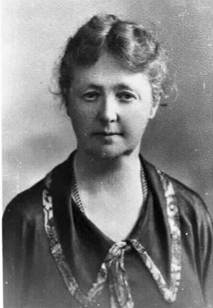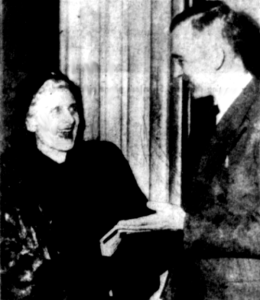The debate on the Insurance Act that was announced in an edition of The Vote went as planned, and The Vote did a follow-up article in its issue:
Insurance Act Debate.
The Women’s Freedom League has from the first refused to comply with the regulations of the Insurance Act, and has not paid one penny in respect of the insurance of its employees.
It is no concern of ours whether this Act is good, bad, or indifferent; we oppose the Insurance Act because it is legislation affecting vast numbers of women, and no woman has a voice in the legislation of this country.
We are determined to show the authorities that the government of women without their consent is both a difficult and costly matter.
But we offer our congratulations to the Women’s Tax Resistance League for arranging the public debate on the Insurance Act which took place at the Caxton Hall.
Sir Edward Busk presided, and Miss Margaret Douglas proposed the following Resolution:—
That this meeting declares that the Insurance Act is undemocratic in character and unjust in operation, and that its hardships press most heavily upon women.
Miss Douglas said that the new elements in our present Insurance Act were compulsion and the card.
In theory, the card was a receipt for money paid in; in practice it was a passport for the worker, a means of registration and identification, it was used as a certificate of character, and as evidence against men who came from a strike area in search of work elsewhere.
Miss Douglas considered that it was undemocratic to set asid, the Truck Act in order to tamper with a man’s wages — his wages at any rate should be secure from the greed of the modern social reformers, who should be urged to carry out experiments of this kind at their own expense!
The Insurance Act was substituting bureaucracy for self-government.
£2,000,000 of hard earned money was being expended on gentlemen who were touring the country in motor-cars, and who possessed extra-ordinary powers to enforce the Act on unwilling contributors.
It was killing the spirit that built up the old friendly societies which were now being forced into competition with Insurance Companies; it was not safe to entrust problems of National Health to people who look at life as a profit making concern.
Miss Douglas further contended that this Act was an injustice to women.
This so-called greatest measure of social reform was careful to leave out those women from its benefits who do their duty by staying in their homes to look after their families; they can only get the accidental maternity benefit on their husband’s card.
Surely that was enticing women to go out of their homes to find an employer!
In the vast majority of cases the 4d. a week contributed by men had to come out of extra economies effected by women in the home.
Sir Victor Horsley in opposing this resolution said that Miss Douglas had given a highly coloured picture of the Insurance Act.
The principle of the Insurance Act, was absolutely democratic; and by it the whole nation was taking part in a measure of National Health.
It was not a German but an English Act, and it was first brought forward in the House of Commons, nearly one hundred years ago by Mr. Curwen, an ultra-Progressive member for Cumberland.
Mr. Lloyd George had shown constructive capacity in financing the movement.
What was offered in its stead?
A return to the old Contract Club system, which was hopeless.
The Insurance Act brought about a redistribution of wealth among doctors, and the poor doctors benefited thereby.
It had done away with the sixpenny doctor, and was a boon to the poorest people in our country.
Through the Insurance Act, the friendly societies had gained an enormous number of adherents, and the insurance of women was a definite crystallisation of the fact that woman was a separate entity, a separate person.
The Insurance Act was an organisation of the forces of the nation against disease.
Several members of the audience took part in the subsequent discussion; with but one exception, all opposed the Act, either in its principle or in its administration.
The critic we appreciated most was the young man who mounted the platform and informed the audience that he was a Liberal, an anti-suffragist, and an opponent of the Insurance Act!
He then proceeded to urge those who objected to it, to tear up their cards this week end.
If only they would do that the Act would be smashed.
We hail this young man as a militant!
On the resolution being put to the meeting it was carried by an overwhelming majority, only twelve voting against it.
F[lorence]. A. U[nderwood].
Women’s Tax Resistance League
Dr. [Katherine] Heanley was summoned at the East Ham Police-court, on , for non-payment of the insurance tax for her servant.
Dr. Heanley explained that her objection to paying was due to the fact that she, as a voteless woman, had no voice in the government of the country.
The magistrate was sympathetic, and admitted that though he might have reasons against paying taxes, they would not be so weighty as hers!
In addition to the arrears, a fine of £1 and costs 10s. was imposed.
A very sympathetic audience listened at an open-air meeting addressed afterwards by Miss Margaret Douglas and Miss Amy Hicks.


